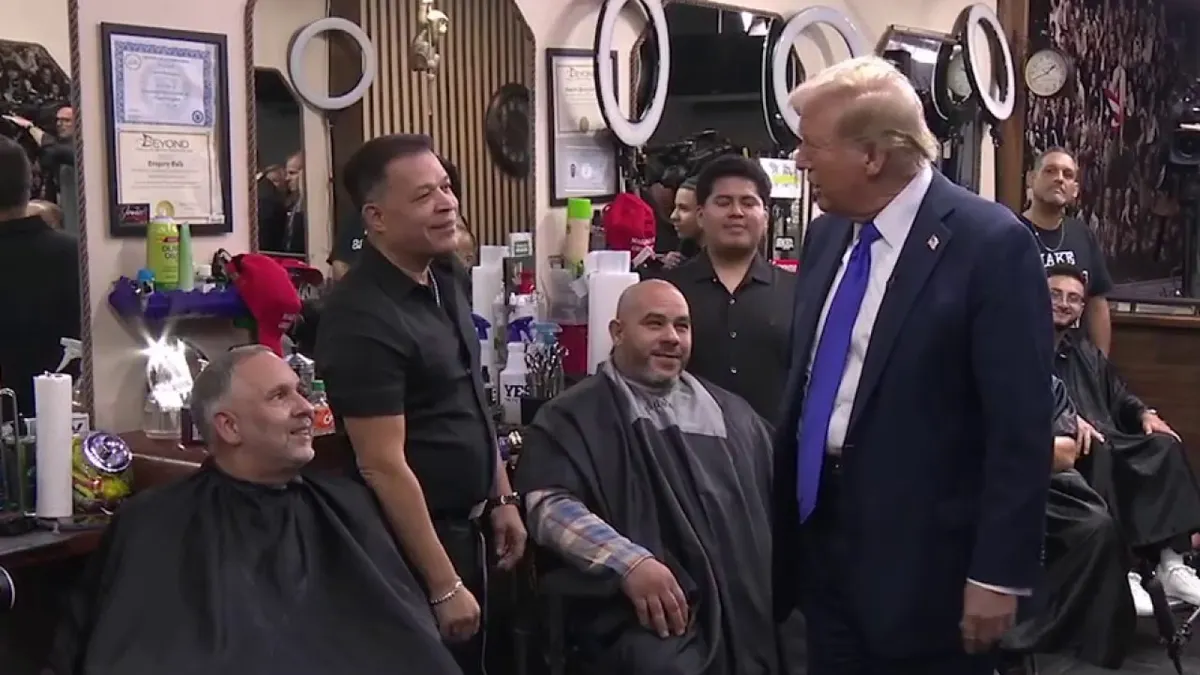October 24, 2024
Last week, former President Donald Trump dropped by a Bronx barbershop with Fox News host Lawrence Jones, and they debated inflation, taxes, and whether we should end federal income taxes. Trump suggested that a return to tariffs could eventually replace federal taxes, offering Americans the biggest tax break in history.
“There Is a Way”: Trump on Ending Federal Taxes.
One barber asked Trump if he thought that federal income taxes would be abolishable after the country’s economy recovered, and Trump shot back: “There is a way! There is a way!” And he then shared with me about the American economy in the 1890s, when it was dependent on tariffs and not income taxes, and, Trump believes, its wealthiest.
“In the old days, we had so much money that we had to set up committees to figure out how to spend it,” Trump explained to the captivated barbershop audience. He added that the current tax system, combined with regulations, was crushing Americans. “People are dying from taxes,” Trump said, expressing his desire to see a dramatic shift in federal tax policy.
The Tariff Proposal: A Possible Return to 19th Century Financing?
Trump’s bronx reopened controversy over his plans to pay for government by taxing the Chinese. Trump has long pushed for tariffs as an engine of American manufacturing and as a means of keeping American industries safe from the competition. Yet the idea of replacing federal income taxes all together with tariffs is unheard of in recent U.S. history.
In a recent analysis by Forbes, contributing editors Robert Goulder and Joseph J. Thorndike discussed the feasibility of such a proposal. While tariffs were the primary source of federal revenue in the 19th century, today’s economic landscape is vastly different. The editors pointed out that tariffs are considered regressive, meaning they disproportionately affect lower-income consumers who would bear the brunt of higher costs on imported goods.
Thorndike told me that Trump’s solution would be welcome for income-tax-tired voters, but it would be mathematically impossible to dispense with all federal income taxes in favour of tariffs. Since the late 19th century, the tariffs’ share of federal revenue has plummeted. “The math is really just impossible when it comes to replacing income taxes with tariffs,” Thorndike concluded.
The Bigger Picture: Tax Reform and Middle-Class Relief
During his conversation at the barbershop, Trump focused on the burdens that high taxes place on everyday Americans, particularly those striving to achieve the American dream. “Everyone could attain the American dream if it wasn’t for the burden of high taxes,” said the barbershop customer who posed the question to Trump. The former president agreed, pointing out that workers are taxed at every step—when they earn money and when they spend it.
Trump likewise touted his administration’s track record of slashing regulations, which he called just as taxing for both business and workers. “I cut more regulations in four years than any other president,” Trump said in his effort to make it easier for companies to thrive.
Is It Possible?
Trump’s vision of eliminating federal taxes may seem far-fetched to some, but it taps into a broader sentiment among many Americans who feel overburdened by taxes. His proposal, while still in its conceptual stages, continues to draw attention as the 2024 presidential campaign heats up. Whether such a drastic overhaul of the U.S. tax system is feasible remains a topic of debate. For now, Trump’s proposal is sure to resonate with his supporters and fuel discussions about tax reform in the lead-up to the election.
Sources:



